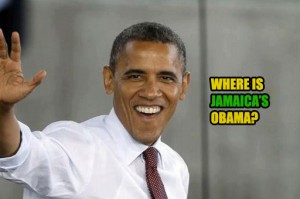Jamaica may well find her Obama?
Mark Wignall’s column in the Sunday Observer asks the question, ‘Where is Jamaica’s Obama?’
It is indeed an interesting question, even if a bit irrelevant given the circumstances of the practice of democracy within both jurisdictions. That notwithstanding, the question quite rightly suggests that Jamaica needs inspirational leadership as the current crop of politicians simply fumble about in the dark, their approach to governance largely led by circumstances rather than by any cogent vision.
It is not that we have been unable to produce visionary leadership in this country, as some would assert, because we have done so in the past. Marcus Mosiah Garvey is a case in point, despite the views of upstanding Jamaicans, of all stripes, who berate his contribution to Jamaica’s social, political and economic development. These same Jamaicans laud Gandhi, Martin Luther King Jr, and Barack Obama as visionaries without realising that the very ideas that these men have so eloquently articulated generated from our own Garvey.

In Garvey’s opinion, any programme of emancipation would have to be built around the question of ‘race first’, as whites had built an unconscious and conscious ideology of race preservation and advancement barricaded by virtue of their control of the economic and political levers. “In a world of wolves, one should go armed, and one of the most defensive weapons within reach of the negro is the practice of ‘race first’ in all parts of the world.” Garvey’s UNIA provided a practical road map for how black self-love could grow from an abstract concept to one that could provide security, economic enfranchisement, political wherewithal. and visibility for the masses whose day-to-day survival concerns did not leave them the liberty for the abstract and intellectual. Black liberation movements were subsequently founded on these principles and the civil rights struggles in America in the 1950s took its cue from the Garvey principles.
Another Jamaican visionary was Michael Manley, whose attempt at creating an egalitarian society in the 1970s places him among that political vanguard bent on creating a better Jamaica for Jamaicans. The linchpin of this movement towards development was the policy of educating Jamaicans, as Manley saw at the time the value of education in “smadditising” the Jamaican population. Manley’s greatest critics demonise him for this approach, which squared him up against the formidable US in terms of the ideological clash that ensued.
One of the greatest setbacks to our development was the dismantling of this policy by Edward Seaga in the period after 1980, and the subsequent dis-education which watered a population of illiterates providing a population of malleable voters. We went on to copy the US model of social and economic development, failing to appreciate that, as a smaller economy, we do need to rely more on our combined efforts rather than the individual approach that is driven by selfishness. It is this approach that has cemented the lack of vision that today assails us; causing us to feed on ourselves as “when you go to get some food, yuh brother is seen as your enemy”. (Marley)
Despite the current paucity of leadership, I do believe that our best days are still ahead of us. The signs are clear that we are making the turn economically as Wignall’s article has indicated, and the resultant fiscal lessons will provide a foundation from which we will have established a learning curve for crafting solutions going forward. The Jamaican Obama may not even be a single individual, but a set of best practices on which we can all agree as a developmental model going forward.


We probably don’t need a Obama,instead we need somebody who will be the vangaurd for moral conciousness and spiritual prudence.
Lying stupid article, Micheal manly was a con man and did know how to govern,stop blaming others